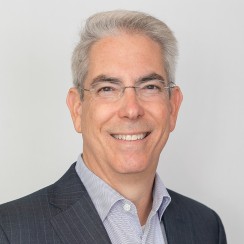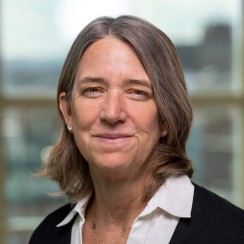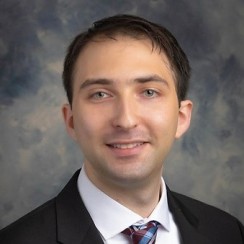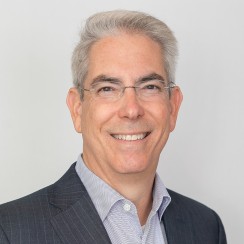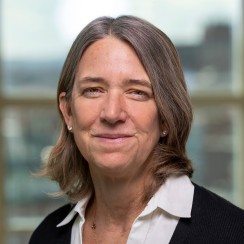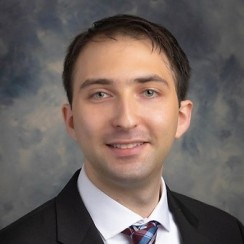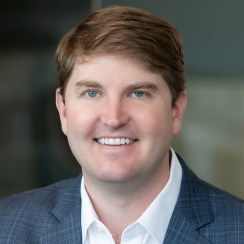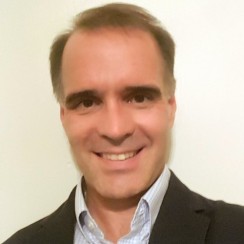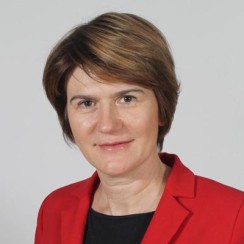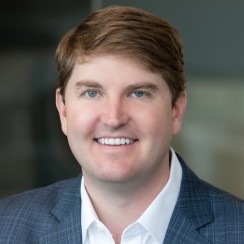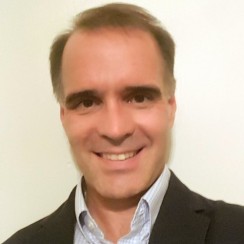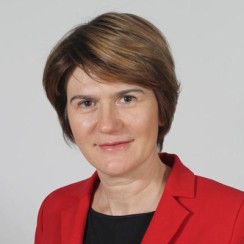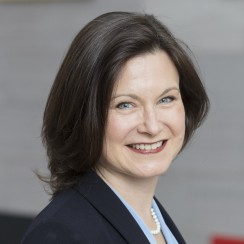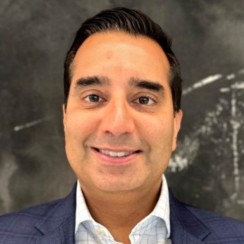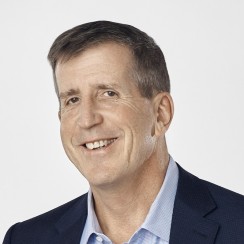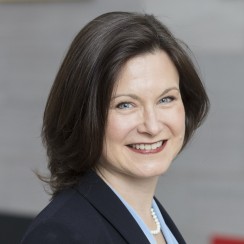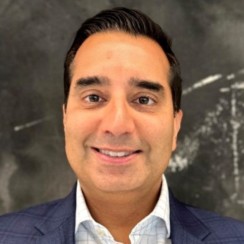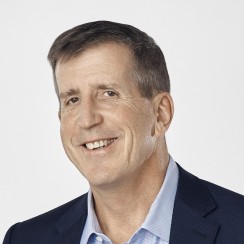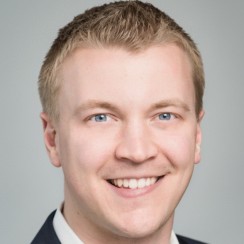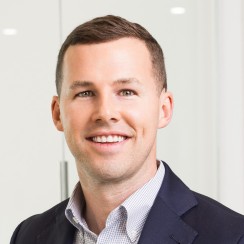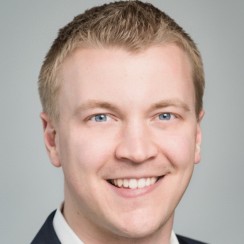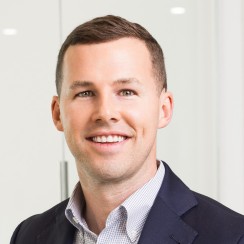The AlphaEdge Recognition Awards are over 30 awards in more than 15 categories recognizing and celebrating members of the investment community. Acknowledged by their peers, for exceptional leadership in the key areas of portfolio construction, including innovation and alpha generation, these prominent individuals were celebrated at the AlphaEdge Recognition Dinner, during Institutional Investor Week, which brought together over 95 allocators from North America.
After an evening that was truly exceptional, Allocator Intel is now presenting their Spotlight Interviews where they share some of their investment experiences.
Spotlight Interviews
Mark Baumgartner is Chief Investment Officer at $4 billion Carnegie Corporation of New York. Based in New York City, he has reinforced a robust culture around the fund’s mission of peace, democracy, and education, built a new investment team, and repositioned the portfolio to incorporate more alternatives in a remote work environment.
Baumgartner's Conversations with II
"Risk literacy and strong risk management practices are really at the heart of what we seek in all of our managers. We are much less concerned with historical performance and much more concerned with how future returns will be achieved [...]We believe managers with a great risk discipline will be much more apt to sustain themselves and their performance in the long term" Read more
Brown University, nominated for Endowment of the Year, is represented by Chief Investment Officer Jane Dietze, who sourced and structured investments in Albania, Macedonia, and Turkey, before joining the $6.5 billion endowment. Outside of work, she is a competitive pickleball player.
Dietze's Conversations with II
"Persistent excess returns are always the product of competitive advantage: That is the common thread that ties together every strategy we pursue. Once we've identified that, we seek out integrity and alignment in our partners; we want to win alongside them. Finally, over time we have developed a strong preference for underlying businesses that create and deliver value to their customers, rather than extract or capture value from counterparties" Read more
Mitchell Green is Investment Officer at the Illinois Firefighters' Pension Investment Fund. During his three years at $7.7 billion public pension fund, based in Lombard outside of Chicago, he helped consolidate 296 pension funds into a new organization, developing the fund’s asset allocation, and recommending all of the investment strategies since the fund was created in 2019.
Green's Conversations with II
"The efficiency of each asset class influences our prioritization. We continue to prioritize asset classes in which active managers have historically added the greatest value. In FPIF’s recent fixed income RFP, we were particularly aware of information ratios, upside and downside capture, and performance attributions. Analysis of performance attributions played the most significant role, as it allowed us to better understand the source of managers’ excess returns." Read more
Matt Miller is a Co-Founder and Managing Director at Grey Rock Investment Partners. He is a member of the Investment Committee for the firm’s Net Zero Opportunities Fund and the Investment and Valuation Committees for the firm’s Natural Resources Funds. At Grey Rock, Mr. Miller focuses on deal origination, valuation, due diligence, execution, project management and divestitures. Mr. Miller serves as Co-Chairman of the Board of Directors for Granite Ridge Resources, Inc. (NYSE: GRNT). Using his expertise in energy ecosystems, Mr. Miller works to ensure that the Grey Rock portfolio maximizes return for a given amount of risk. Previously, Mr. Miller worked at McKinsey & Co. and Bluescape Group. Mr. Miller holds a BS in Commerce with Distinction from the University of Virginia, and he is a CFA Charterholder
Miller's Conversations with II
"...At the end of the day, I’m your fiduciary, so if you hand me $1, my goal is to hand you back $3, $4, or $5. Why do I bring this up? As an investor, I am focused on “full-cycle returns.” If you pay too much to acquire a business or enter a deal, that’s where most investors trip up. To use a real estate analogy, it’s very obvious that Fifth Avenue real estate is great, but how much do you pay to acquire a building on Fifth Avenue? Some are learning this lesson the hard way currently." Read more
Fred Greear has been with Virginia-based Carilion Clinic since 2015 where he oversees a $3 billion investment portfolio, split between a hospital operating portfolio and a defined benefit pension portfolio. Previously, he spent three years at Huntington Ingalls Industries where he was responsible for managing the company's hedge fund and fixed income pension investments. During the prior decade, he worked in different roles at Lord Abbett and Cohen & Steers before transitioning to the plan sponsor side of the business with the Pension Boards, United Church of Christ. Mr. Greear holds an MBA in finance from Vanderbilt University and a BA in philosophy from Denison University and is a CFA charterholder.
Greear's Conversations with II
"We have approximately 70 investment firm relationships in the portfolio. We have a few multi-manager relationships, such as platform relationships, which we believe is an efficient way for us to gain exposure to targeted areas of the market. We view our multi-manager relationships as strategic, giving us access to emerging managers as well as co-investment opportunities. We balance our meaningful exposure to smaller, emerging manager with a few of the largest investment management firms, which also provide us broader resources such as economic and market research." Read more
Petya Nikolova is the Head of Infrastructure Investments for New York City Comptroller’s Office. Ms. Nikolova built the infrastructure asset class and is investing the infrastructure allocation on behalf of the $260 billion New York City Retirement Systems. The exposure to infrastructure on a committed and invested basis is over $8.0 billion and well diversified across strategies, sectors and geographies.
Nikolova's Conversations with II
"We primarily invest through managers, and manager selection is a key focus. We look for managers who have the right experience and a strong track record in the sectors in which they are investing. Importantly, we also focus on understanding how our partners are built for the future [...] one in six asset managers could disappear by 2027, either through going out of business or being acquired by larger groups. This highlights the significance of the questions we have always asked regarding alignment, value creation, and succession." Read more
Christine Kelleher has been Chief of Investments at the National Gallery of Art in Washington, D.C., since 2017. In partnership with external consultants and the National Gallery’s Investment Sub-Committee, she has built out the alternative asset programs, upgraded traditional asset classes, introduced a diversity initiative, and is considering if and how to formally consider sustainability in the investment process.
Kelleher's Conversations with II
"We’re looking for proven investment teams that are correctly incentivized, internalize the responsibility of managing mission-driven capital, and truly have long-term approaches to investing and enterprise building. I love to hear that they have succession planning in place, that they have the resources to attract and retain talent, and that they have been thoughtful about raising capital. It’s a particular bonus if their former colleagues are investing in the fund." Read more
At Kactus Capital Management, nominated as Family Office of the Year, Chief Investment Officer Sid Malhotra has increased the single-family office’s allocation to smaller and first-time funds across both public and private markets.He is a graduate of the University of Michigan, where he received his bachelor’s degree in economics. He earned an MBA in Analytic Finance and Economics at the University of Chicago Booth School of Business. Sid entered the investment management industry on the GP side, including stints at Citadel and Pacific Alternative Asset Management Co. (PAAMCO Prisma).
Malhotra's Conversations with II
"We have a broad and unconstrained mandate that allows us to look at all types of investments, spanning fund investments, co-investments, and direct investments, across public and private markets. Every investment is different, which means we bring a flexible and bespoke approach to our diligence. Our process is a dynamic mix of experienced qualitative judgment backed by and augmented with rigorous quantitative analysis. We are always thinking about risk/reward for each investment, including absolute return potential and the risk of principal impairment.." Read more
Paul Marcus is the Chief Executive Officer and Founder of Marcus Partners, a vertically integrated real estate private equity firm with a strong history of successful investment, management, and development. The firm is headquartered in Boston, with regional offices in Metro New York City and the Mid-Atlantic. With $1.9 billion in assets under management, it focuses on value-add investment strategies across industrial, multifamily, life science, and other property types where it can create value and maximize risk-adjusted returns. Marcus Partners and its affiliates owns, controls, operates or is developing more than 8 million square feet of real estate and 1,900+ multifamily units.
Marcus' Conversations with II
"We held the final close for Fund IV in July 2022 with commitments totaling $650 million. Our original hard cap was $550 million. We feel very privileged to be investing on behalf of a select group of highly regarded institutional investors and family offices. Our long-term relationship with these institutions and families is something that our firm values considerably. With regard to our business partnerships more broadly, we are highly selective and many of these relationships span decades." Read more
Since Yangge Seaman joined the $1.5 billion foundation in May 2021, she has led the private markets build-out, an internal investment build-out via Zoom interviews, and the process of bringing the entire research team inhouse. Outside of work, she and her husband enjoy traveling with their two toddlers, 4 and 2 years old.
Seaman's Conversations with II
"I spend a lot of time thinking about why a particular market opportunity exists in the first place. Why are we seeing this deal, and why is it “our turn” to invest in it? When a fund manager checks all the boxes and has demonstrated an amazing track record, of course that fund is likely to be oversubscribed, and there may be limited capacity available to us despite the mission we represent. There is some efficiency to the private equity funds market. As a result, I often think about what risks I am okay taking, where others may not." Read more
Since Michael Kakenmaster joined the $1 billion endowment two years ago, he has restructured the portfolio, in order to double the fund’s target of private investments to 20% of the total portfolio. He and his wife have two kids, 1 and 3 years old, and he likes to play golf and read.
Kakenmaster's Conversations with II
"We typically can find out a good amount of information about the GPs through our network, and when the GP isn’t forthcoming, that’s not a great sign. Commitment to keeping an open dialogue, making sure we’re fully informed on changes, meaningful or not, from a partnership perspective, means a lot and being able to chat, maybe not with the key partners, but junior professionals is important for us." Read more
Justin Young helped transformed the fund’s strategic partnerships, portfolio diversification, and pursuit of the next generation of talent for the $1.1 billion, not-for-profit investment manager for the Oklahoma State University Foundation. He enjoys reading, taking road trips, and cooking with his wife.
Young's Conversations with II
"The thing I’m most proud of is restructuring and implementing South Carolina’s $5 billion portable alpha program. We spent a year researching and designing the framework and subsequently reallocated over $3 billion. The program materially outperformed broader hedge fund indices and peer programs and we also added $1.4 billion in excess returns. For the last two fiscal years, we annualized just shy of 15% per year with no beta and a Sharpe ratio averaging between 3 and 4." Read more
Read more spotlight features in the topics section
Get involved for next year by contacting us here to attend
Become a Sponsor for the AlphaEdge Recognition Awards by Contacting Us Here

